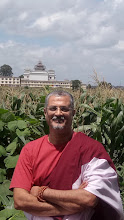Sakaal Times, Editorial, 30.08.2011
The pendulum has been swinging between stalemate and hope over the past few days and this has kept the country on the edge. Ofcourse, only those who wear nationalist feelings seem to be the pall-bearers of this movement . Others are going about their lives as if this burden is only for those to carry, who have little else to do.
The biggest bogey that the party in office and opposition has called is that parliament is supreme. It is a convenient statement to make, as they find their backs to the wall. The truth is, parliament is not supreme. Parliamentary democracy is. What this essentially means is that parliament consists of parliamentarians, who inturn are elected victorious by a percentage of votes polled in their respective constituencies. This figure hovers between 15-22% of the total electorate of that constituency. Which again means that the victorious candidate represent the voice of that percentage of people. This percentage roughly translates to 2.5 to 3.5 lakh votes in a given parliamentary constituency. It is these number of registered voters that send the elected person to parliament.
Now, what has clearly emerged over the past 10 days is that the number of citizens that have come on the streets in most of the 543 parliamentary constituencies nationwide (and have come out of their own free volition and without inducements, mind you) have been many times this figure. So in a parliamentary democracy system - which is nothing but a conglomeration of parliamentarians who in turn have been sent there to work on behalf of a percentage of citizens who voted for him/her - is supreme and the elected representatives are not delivering, evident from the swathes of people out on the streets, then something is not correct and therefore needs correction.
Many of us have been to restaurants for a meal. As standard operating procedure, the waiter seeks our choice of meal, notes it down, conveys the message to the chef who inturn makes the preparation as ordered and delivers it to us. The patron, is pleased and when s/he is pleased, so is the restaurant management. No confusion. Cut to parliamentary democracy. Citizens being patrons, place a request for good governance measures (strong anti-graft law included) with their elected representatives, who in turn carry this request to the union cabinet who inturn make out policies to the effect, introduce it in the form of bill or a debate, to the very same parliamentarians who put forth the request, who logically should pass it without too much of a fuss, which then becomes an Act or Law which citizens must relish. No confusion again. So far so good.
Now look where the problem arises. Imagine, if the waiter never bothered to ask its patrons what they'd prefer to eat, and conveyed whatever they thought the patron may like, and the chef were to prepare a totally different dish and place before the diner, well, least to say, hell would break loose. Well, this is just what has happened.
Back to the point. if parliament is not supreme as it is only made up of parliamentarians and in parliamentary democracy, the elected representative must deliver (or atleast is expected to do so) the wishes of the people, in whom they have reposed faith, and if they do so, no confusion. If not, unrest is inevitable. A possible alternative is right to recall. However, in the absence of such a law yet in our land the next viable method that Constitutionally exists, is referendum.
Why is the government and the opposition not pushing for this option? An officially backed national referendum on the vital inclusions of the Lokpal Bill. Let people decide and make the government's heartburn lesser. How simple is that?
The disconnect between various sections of civil society is all to apparent. The total disconnect between the political class and a larger section of citizens is now beyond any doubt. The government is in no mood to bypass parliamentary procedures. And need not although it is another matter that it then collectively did not take such a 'holy' stand and not bring in a strong anti-graft law all these decades, even while all this time tens of thousands of crores of public money were being salted away to tax havens. In a scenario of impasse such as this, what then stops it from going back to the people to ask them what they want. Isn't this the very basis of parliamentary democracy?
It would do good for our netas to remember that the very first three words of the preamble of the Indian Constitution is 'We the people...' and not 'we the parliament' nor 'we the parliamentarians' nor any other.
Can we have this done quick so the nation can go back to work and meet your GDP growth figures, Mr PM? National happiness be damned!
Friday, August 26, 2011
Subscribe to:
Post Comments (Atom)

No comments:
Post a Comment